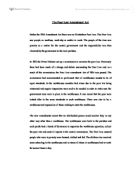The workhouses were not all good however, as they worked under the principle of ‘less eligibility’. This meant that a pauper in a workhouse was not to be better off in comparison to the lowest paid independent worker. The workhouses were therefore of deliberately harsh conditions in order to persuade the poor to find jobs instead of entering the workhouse. Families were split up and only allowed short visits to each other each day, uniforms were compulsory for every inhabitant, and the food provided was terrible. Many people feared the workhouses and the conditions surrounding them, and it was felt that the New Poor Law was punishing the people who were poor through no fault of their own. Richard Oastler called the work houses “prisons for the poor” due to the low standards that had been set by the government.
The new Poor Law Amendment Act has been recommended for a number of reasons. In 1795 the Speenhamland system had meant that there was a support in peoples’ wages. This then led to an increase in population in the 1800’s and by 1850 the population had doubled. This was because of a decline in the death rate. This meant that there were more people for families to support. Also the industrial revolution played a big part in the new poor law. The industrial revolution brought on independence on wages as jobs were few. This meant employers could pay anything as they knew that the poor people needed work two keep them out of the workhouses. The move from domestic to factory production also meant that persons living far from the factories found it harder to get a job because of their lack of mobility, therefore rural poverty and therefore more people entering the harsh workhouses.
As I said workhouses worked under the term of ‘less eligibility’. The conditions inside were almost of prison standards, although you could leave if you believed you could afford not to have the governments help. The commission hoped people would be discouraged from looking for help. This then led to a lot of stigma being put towards the poor people who entered workhouses.
There was also a difference seen between women and men with the 1874, 10 hour act. These regulated hours of work for women and children and only men could work nights. The act then meant that by enabling a different pay for day shift than night shift, the man could earn more and be seen as the bread winner of the family.
The poor law also meant that, for children, some schooling was provided. This was used to bring Ireland into line with England as they were taught English language and English ways over their Irish heritage.
In 1930 Beverage made a bare necessities ‘poverty study’ to provide people with social security. This too was worse than working for a good wage as it did not lift people out of poverty. Townsend said this was because beverage set the basic level of income to law. The low wages of this period also meant that the working poor were the largest group of people susceptible to poverty.
Being poor also attracted a lot of stigma. The upper and middle classes believed they were paying poor people to be lazy, yet many poor people could not lift themselves out of pauperism. This can still be seen to day as many people see accepting benefits as a personal failure to provide for yourself or your family and refuse to accept help from the government because of this stigma that is attached to means testing.
An example of the selectivity method of welfare would be the free school means to children whose family earn an income below the prescribed income levels. This meant children stood out in comparison to other, more well off, children as they were often provided with a ticket instead of paying like other kids. This method of selectivity meant that families felt stigmatised against the system perpetuated inequalities, and then they often felt that it would be better not to make a claim rather than admitting that you were poor.
Ruth Lister claimed that there are people who fail to claim benefits. She said “in 1999/2000, it is officially estimated that in the UK between £1.96 and £4.07 billion was unclaimed”. (p262, 2003)
The role of stigma has therefore had a huge influence on those experiencing poverty. More and more people fail to claim as they feel that they are being seen as burdens upon the rest of society. Ruth Lister also stated that “services confined to the poor can all too easily become poor benefits and services”. (p263 2003) and then leads to people not seeing themselves as equals.
Means testing can also be a complex process. The forms need to enable all the required information is provided, and if these are seen as to complex for a particular person they may reject applying. This then made many people feel they were not smart enough to fill in the form and did not seek help for fear of being made out to be even more inferior to others.
Other benefits had high take up points, (e.g. 99% for child benefit and retirement pension) as they were common to all people of any class. However, many people failed to apply for less common benefits, even though they were entitled, because their pride was at stake due to the stigma surrounding benefits.
Alcock, P et al Blackwell Publishers (2003)
Rose, M Macmillan (1986)
Checkland E & Checkland S (ed.) Penguin
“The Poor Law Amendment Act: 14 August 1834” (2002)
“The 1834 Poor Law Amendment Act” Peter Higginbotham (2001)







